Mad Men is best TV in years
Oct 28th, 2008 | By Dominic Berry | Category: Entertainment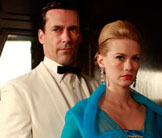 Almost everyone I ask still says they aren’t watching Matthew Weiner’s stunning new TV series, Mad Men – about a mid-level New York advertising agency in the early 1960s. Or they haven’t even heard about it yet. So it makes sense when John Sturgeon, who writes for a student newspaper in Philadelphia, describes the show as “critically acclaimed but seldom-watched.”
Almost everyone I ask still says they aren’t watching Matthew Weiner’s stunning new TV series, Mad Men – about a mid-level New York advertising agency in the early 1960s. Or they haven’t even heard about it yet. So it makes sense when John Sturgeon, who writes for a student newspaper in Philadelphia, describes the show as “critically acclaimed but seldom-watched.”
The series nonetheless managed to win the Emmy for top US TV drama this year. And according to CNN.com/entertainment: “Shy of being pumped into the water supply, Mad Men is everywhere – except on most people’s TV sets … About 1.5 million US viewers tune in weekly, with another half-million watching later on DVRs. That compares with the 19 million-plus audience for last week’s No. 1 program, CSI: Crime Scene Investigation on CBS … Doesn’t matter. It’s Mad Men that’s permeating the zeitgeist.” I can confess myself that I altogether agree with Jo Ann, who posted this past August on the part of the Charlie Rose website that archives his report on the top drama series: “Mad Men … is by far the best show on tv.” I find it utterly gripping. And I think this is partly because it is delivering poignant hints about where an older America is headed today. (It is not surprising that a “Mad Men DVD was spotted at the elbow of Barack Obama aboard his campaign plane.”)
Great writing …
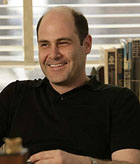 All told Mad Men won six awards at the 2008 Emmys. Along with top drama, program creator Matthew Weiner “took the award for outstanding writing for a drama series for Smoke Gets in Your Eyes,’ his pilot script” for the show.
All told Mad Men won six awards at the 2008 Emmys. Along with top drama, program creator Matthew Weiner “took the award for outstanding writing for a drama series for Smoke Gets in Your Eyes,’ his pilot script” for the show.
Matthew Weiner is “creator, executive producer, head writer, and show runner” for the series. He wrote the Mad Men pilot, Smoke Gets in Your Eyes‘ (focused around a fictional ad campaign for Lucky Strike cigarettes) as a speculative script, as long ago as 2000.
The “Sopranos creator and executive producer David Chase offered Weiner a job as a staff writer on his show after reading the script … After The Sopranos had finished its run, Weiner began looking for a network to produce Mad Men. He presented the show to HBO and Showtime.”
Both “networks passed on it.” And Weiner “eventually pitched the series to AMC,” a basic cable channel that began as “American Movie Classics.” AMC “had never produced an original television series.” It nonetheless “picked up the show, ordering a full 13-episode season” for 2007 – and then a second 13-episode season for 2008.
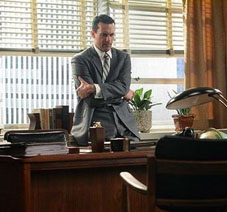 As always in such things, Matthew Weiner has had a great deal of writing and other behind-the-scenes help. But he is clearly the brains behind Mad Men, and he remains the “reportedly … very controlling and demanding” intelligent designer of its continuing evolution.
As always in such things, Matthew Weiner has had a great deal of writing and other behind-the-scenes help. But he is clearly the brains behind Mad Men, and he remains the “reportedly … very controlling and demanding” intelligent designer of its continuing evolution.
Weiner was born in Baltimore in 1965, and grew up in Los Angeles, where he still lives with his wife and four sons. So his sense of the world of the Manhattan ad man in the early 1960s is something he has merely (if also very adroitly) acquired second hand, from books, music, movies, old TV shows, and who knows what other more subtle sources.
Yet he clearly has a deep interest in the more recent American past, which set the stage for his own life – as someone born in the middle of the 1960s whose adulthood began in the late 1980s, and who has not yet quite reached his mid 40s, even today.
Earlier this year the New Jersey TV critic Alan Sepinwall aptly explained: “I spent a while with Matthew Weiner at AMC’s press tour party … when I mentioned that I hadn’t seen a particular [Mad Men] episode, he smiled and said, You’re gonna love it. It’s about time travel’ … when I finished the episode in question, I understood what he meant. Where some shows set in the past can’t help but feel like it’s a bunch of actors playing dress-up, Mad Men made me feel like I was getting a glimpse of what New York of that era really looked, sounded and smelled like.”
And subtle nods to literature …
 The first season of Mad Men is set in 1960, and includes the Kennedy-Nixon election as background. (The fictitious Sterling Cooper agency at the centre of the show is working for the Nixon campaign, and not too happy when Kennedy wins – but not too sad either. Hey, it’s just advertising.) The second season jumps ahead to 1962, and ends in the midst of that year’s Cuban Missile Crisis.
The first season of Mad Men is set in 1960, and includes the Kennedy-Nixon election as background. (The fictitious Sterling Cooper agency at the centre of the show is working for the Nixon campaign, and not too happy when Kennedy wins – but not too sad either. Hey, it’s just advertising.) The second season jumps ahead to 1962, and ends in the midst of that year’s Cuban Missile Crisis.
At the start of the second Mad Men season, late this past July, Brad Frenette of Canada’s own National Post urged: “Aside from the attention to detail, clever writing and sharp acting, one of the things that stands out about the series and makes it sing is its subtle nods to literature.”
As an unusually intriguing case in point, in the second season’s first episode the lead character, Don Draper (aka Dick Whitman), the brilliant creative director at Sterling Cooper, is having lunch by himself at a smoky Manhattan bar. A few bar stools away some New York intellectual is reading Meditations in an Emergency, by the poet Frank O’Hara.
From the September 25, 2008 issue of the New York Review of Books you can also discover that Frank O’Hara was 36 years old in 1962 – the same age as Matthew Weiner’s fictional Don Draper is supposed to be that year. And if Don were more exactly concerned with such things, he would probably be impressed that: “Almost everyone who remembers O’Hara from his heady days in bohemian New York in the 1950s and 1960s remembers him as the liveliest guest at any party in Greenwich village.”
 In any case, Don asks the intellectual in the bar if it’s a good book. And he’s somewhat contemptuously told that he wouldn’t like it. (He is a suit after all, in the early 1960s especially, and he looks the part.) Later in the episode Don nonetheless goes on to buy the book and read it. Brad Frenette goes on to explain in the National Post: “The episode closes as Draper mails the book to a mysterious someone with an attached note.[This reminded me of you.’] Over the montage runs Draper’s voiceover reading a passage of O’Hara’s poem Mayakovsky’: Now I am quietly waiting for / the catastrophe of my personality / to seem beautiful again, / and interesting, and modern.”
In any case, Don asks the intellectual in the bar if it’s a good book. And he’s somewhat contemptuously told that he wouldn’t like it. (He is a suit after all, in the early 1960s especially, and he looks the part.) Later in the episode Don nonetheless goes on to buy the book and read it. Brad Frenette goes on to explain in the National Post: “The episode closes as Draper mails the book to a mysterious someone with an attached note.[This reminded me of you.’] Over the montage runs Draper’s voiceover reading a passage of O’Hara’s poem Mayakovsky’: Now I am quietly waiting for / the catastrophe of my personality / to seem beautiful again, / and interesting, and modern.”
In the penultimate episode of the second season (which first aired just this past October 19) we finally discover who Don sent the book to. And it just hints at the less strictly historical novelistic fascinations of Mad Men to say that this woman (there are many women in Don’s life) lives far away in Southern California, close to the Pacific Ocean (like Matthew Weiner in real life). And she is the widow of the real Don Draper, with whom Don’s original persona Dick Whitman fought in the Korean War …
If you haven’t actually watched any of Mad Men yet yourself, it would be giving too much away to say anything more about the actual plot at this juncture …
It nonetheless says a lot about the recurrent artistic unity which helps make Mad Men so gripping that the very last episode of the second season – appearing just this past Sunday, October 26 – is itself called “Meditations in an Emergency.” The emergency in this case is the Cuban Missile Crisis, which, in case you’ve forgotten, almost led (or so it seemed at the time) to a real Third World War, with real live nuclear weapons, between the USA and the USSR. Like most other things, the exurban greater New York trophy marriage of the Don Draper who was originally Dick Whitman, who grew up on a farm (maybe), and didn’t die in the Korean Warm, has apparently survived this particular emergency. Now we are just desperately wondering what will happen in season three …
And a great cast …
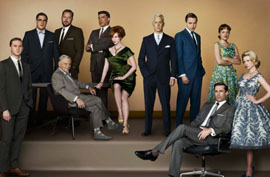 I’ve already come close to using up most of the space I am theoretically allotted. I long ago discovered that I could go on watching Mad Men for a very long time, if only my TV set would oblige. Now I may be discovering that I could go on writing about it for many, many pages more. Of course I wouldn’t want to do that. It’s not the kind of crisp, right-to-the-point copy-writing that Don Draper would like …
I’ve already come close to using up most of the space I am theoretically allotted. I long ago discovered that I could go on watching Mad Men for a very long time, if only my TV set would oblige. Now I may be discovering that I could go on writing about it for many, many pages more. Of course I wouldn’t want to do that. It’s not the kind of crisp, right-to-the-point copy-writing that Don Draper would like …
But it would be wrong to leave the subject without saying something at a little length about Mad Men‘s altogether excellent cast. Starting with the brilliant Sterling Cooper creative director Don Draper himself, who is brilliantly played by Jon Hamm. (Who I certainly don’t remember having ever seen before, though as I learn more about him online it seems I must have: I have some vague recollection, e.g., of seeing the movie Kissing Jessica Stein, in which he apparently appeared with his Los Angeles live-in girlfriend, Jennifer Westfeldt.)
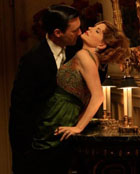 Again, I couldn’t do better on Jon Hamm than Jo Ann, on the Charlie Rose website. He “has that classic leading man twinkle you don’t see anymore, you know that Cary Grant old hollywood thing and there is an honesty and genuine quality to his acting that really make you love Don Draper even though he’s a bit of a rascal.” (Though I would say Don Draper is more than a bit of a rascal: he is at least very close to a womanizer. And why is it that women like Jo Ann always fall for womanizing guys like Don Draper instead of noble, upright types like me?)
Again, I couldn’t do better on Jon Hamm than Jo Ann, on the Charlie Rose website. He “has that classic leading man twinkle you don’t see anymore, you know that Cary Grant old hollywood thing and there is an honesty and genuine quality to his acting that really make you love Don Draper even though he’s a bit of a rascal.” (Though I would say Don Draper is more than a bit of a rascal: he is at least very close to a womanizer. And why is it that women like Jo Ann always fall for womanizing guys like Don Draper instead of noble, upright types like me?)
Jo Ann is also good on Don Draper’s boss, Roger Sterling (son of the now presumably deceased Sterling who makes up the first name of the Sterling Cooper ad agency). Roger is very effectively played by the admirably grey-haired eminence, John Slattery. And as Jo Ann says: “Mr. Slattery he’s the yang to Hamm’s ying the scenes between these guys give Mad Men its core.”
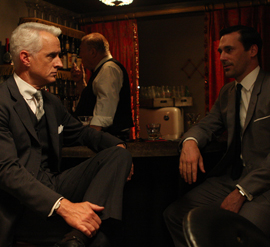 (This is probably also a good time to note that Charlie Rose’s midsummer 2008 interview with all three of Matthew Weiner, Jon Hamm, and John Slattery makes for some excellent TV in its own right. And it is also a good introduction to various deeper Mad Men secrets.)
(This is probably also a good time to note that Charlie Rose’s midsummer 2008 interview with all three of Matthew Weiner, Jon Hamm, and John Slattery makes for some excellent TV in its own right. And it is also a good introduction to various deeper Mad Men secrets.)
Life at the office is what counts most in Mad Men. But it isn’t everything. And before going on to the other leading office characters I should mention Don Draper’s drop-dead gorgeous wife, Betty Draper, alluringly played by the magnificently named January Jones. Don and Betty live “in the suburbs outside of New York City” (nowadays we might say exurbs: Don takes the train to work), with their two young children – a boy and a girl.
 On the surface they are a glittering near-perfect family of the era. But only a little deeper there are all the seething tensions that such 1960s feminist authors as Betty Friedan and Gloria Steinhem wrote about (in books that Matthew Weiner has clearly devoured). Don and Betty almost broke up in the second season. Who knows what lies ahead for them now?
On the surface they are a glittering near-perfect family of the era. But only a little deeper there are all the seething tensions that such 1960s feminist authors as Betty Friedan and Gloria Steinhem wrote about (in books that Matthew Weiner has clearly devoured). Don and Betty almost broke up in the second season. Who knows what lies ahead for them now?
Meanwhile, back at the office there is, at the theoretical very top of the heap, the aging Bertram Cooper, played very well by Robert Morse, and officially described as the “senior Partner of Sterling Cooper,” who “commands respect from the entire Sterling Cooper staff.”
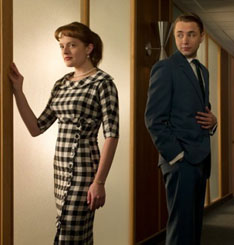 As true as this may be, we the ordinary viewers do not see all that much of Bertram Cooper. Much more important, e.g., is the “ambitious young Account Executive” Pete Campbell, brilliantly played by Vincent Kartheiser. Then there is Peggy Olson, played equally well by Elisabeth Moss. She starts out as Don Draper’s secretary and then rises to become an increasingly ambitious and savvy female copy writer (still a comparatively rare species in 1962). Pete and Peggy have some sordid half-romantic adventures as well – nicely brought to an intriguing moment in the last episode of the second season.
As true as this may be, we the ordinary viewers do not see all that much of Bertram Cooper. Much more important, e.g., is the “ambitious young Account Executive” Pete Campbell, brilliantly played by Vincent Kartheiser. Then there is Peggy Olson, played equally well by Elisabeth Moss. She starts out as Don Draper’s secretary and then rises to become an increasingly ambitious and savvy female copy writer (still a comparatively rare species in 1962). Pete and Peggy have some sordid half-romantic adventures as well – nicely brought to an intriguing moment in the last episode of the second season.
And then there is Don’s nemesis, the head of account services Herman “Duck” Phillips, played by Mark Moses. By the end of the second season he has arranged for the British group he used to work for to buy Sterling Cooper, while he takes over as president of the resulting new firm in New York. In the last episode, however, Don appears to have neatly turned some tables on Duck yet again. Stay tuned.
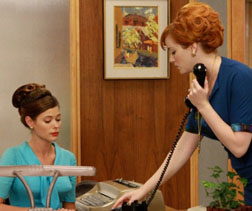 Then there is the lovely curvaceous Joan Holloway, played by Christina Hendricks. She is the Sterling Cooper office manager – and a former mistress of Roger Sterling. Joan is now about to marry a doctor, maybe, just as Roger is about to marry yet another younger employee (Don’s new secretary, Jane Siegel, played by Peyton List), over the costly objections of Roger’s upscale society wife of many years, Mona, played intermittently by Talia Balsam. (And this is the main reason Roger welcomes Duck Phillips’s scheme to sell Sterling Cooper, etc, etc..)
Then there is the lovely curvaceous Joan Holloway, played by Christina Hendricks. She is the Sterling Cooper office manager – and a former mistress of Roger Sterling. Joan is now about to marry a doctor, maybe, just as Roger is about to marry yet another younger employee (Don’s new secretary, Jane Siegel, played by Peyton List), over the costly objections of Roger’s upscale society wife of many years, Mona, played intermittently by Talia Balsam. (And this is the main reason Roger welcomes Duck Phillips’s scheme to sell Sterling Cooper, etc, etc..)
Very, very quickly (and still leaving out all too many excellent actors), there is also: Michael Gladis as “Paul Kinsey … a young Copywriter climbing his way up the corporate ladder;” Aaron Staton as “Ken Cosgrove … a young Account Executive climbing his way up the corporate ladder;” Rick Sommer as “Harry Crane … a married up-and-coming Media Buyer;” Bryan Batt as “Salvatore Romano … the Art Director for Sterling Cooper” (and probably secretly gay); and Tom Hanks’s son, Colin Hanks, as “Father Gill … a visiting priest at the Catholic church which Peggy [Olson]’s family attends” (who is probably secretly in love with Peggy too, or maybe it’s vice-versa: who knows?).
What about the third season … (and the realism of all the drinking and cigarettes)?
 So … with all its at least critical success so far, you would think there just has to be a third season of Mad Men. And it does seem that this is probably true. (According to the latest news as well: “Mad Men ends second season with record ratings.”)
So … with all its at least critical success so far, you would think there just has to be a third season of Mad Men. And it does seem that this is probably true. (According to the latest news as well: “Mad Men ends second season with record ratings.”)
The cast is apparently largely signed up for a third season with AMC. The ultimate creative genius Matthew Weiner has yet to strike a deal, but he is currently talking as if this is just a matter of time. All going well, it appears that the third season would actually start to appear on our North American TV sets in perhaps the late spring or early summer of 2009.
(Meanwhile, it wouldn’t be entirely surprising if the 26 episodes of the first two seasons were repeated at some point between now and then. You can now purchase the Season One DVD on amazon.com for $30.99 US, and no doubt a Season Two DVD will be out soon.)
 However you look at it., Matthew Weiner and his associates in all camps would seem to have a lot of available material for a third season and considerably beyond – as they work their way through the rest of the still seminal American decade of the 1960s. And with a Barack Obama perhaps in the wings at last, it now seems that America may ready to pick up and face up to the inspiring as well as often frightening prospects that began to arise during those fascinating fateful years. (Everything from Ronald Reagan down to the second George Bush was a frightened retreat, with some vague breathing room during the two Clinton administrations?)
However you look at it., Matthew Weiner and his associates in all camps would seem to have a lot of available material for a third season and considerably beyond – as they work their way through the rest of the still seminal American decade of the 1960s. And with a Barack Obama perhaps in the wings at last, it now seems that America may ready to pick up and face up to the inspiring as well as often frightening prospects that began to arise during those fascinating fateful years. (Everything from Ronald Reagan down to the second George Bush was a frightened retreat, with some vague breathing room during the two Clinton administrations?)
On a very final note, there has been much comment about all the drinking and smoking that goes on in Mad Men – in an effort to depict one superficial but important real truth about the North American universe of the early 1960s. My wife, however, claims that if anyone drank as much as the advertising world denizens on Mad Men do in real life, they would drop dead by the end of the season. It is all a bit of hyperbole for dramatic effect. It is certainly true that almost no one quite drinks like this any more (not right in the office in any case), even in the advertising business. And we are all probably living a little longer as a result.
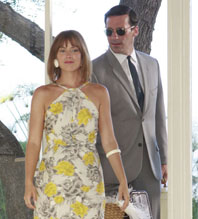 As far as the ubiquitous cigarette smoking goes, it has been said that it mostly involves herbal cigarettes, for the health of the present-day actors. Jon Hamm has provided some more direct intelligence, in an interview earlier this year:
As far as the ubiquitous cigarette smoking goes, it has been said that it mostly involves herbal cigarettes, for the health of the present-day actors. Jon Hamm has provided some more direct intelligence, in an interview earlier this year:
“How is smoking herbal cigarettes?
Terrible. They taste like a mixture between pot and soap.
“Does anyone on set smoke real ones?
Some people do, but not to the extent that we smoke the fake ones or else we’d all be dead.
“Doesn’t it make the set stink? Your clothes, your hair?
Yeah, and I wear contacts and it dries out your eyes and your skin, so it’s a drag, But it looks real and it looks really cool so
“So you come home from work and smell like you’ve been out at a bar all night?
Well, that’s not that far away from the truth, you know?”
UPDATE I: It is now (early summer 2009) quite clear that the first episode of the third season of Mad Men will air on Sunday, August 16, 2009. There also seems some prospect that the show will win another Emmy this year. For further intelligence, from an appropriately well-informed and enthusiastic commentator see  “Mad Men Gets It Right” from the Huffington Post!
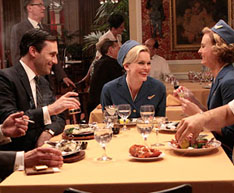 UPDATE II : A report on “Waiting for the third season of Mad Men” appeared today (July 29, 2009). It describes a promotion party held in Pasadena recently. A little about what we have to look forward to was apparently let slip (some of which was already hinted at in the last episode of season two) : “The storyline is now about to enter the year 1963 — a very big year in American life … Sterling Cooper has been taken over by savvy Brits intent on making agency veterans scrap for executive positions. Don and Betty are seemingly back to their happy home life with the kids. Then comes another business trip. And a stewardess.”
UPDATE II : A report on “Waiting for the third season of Mad Men” appeared today (July 29, 2009). It describes a promotion party held in Pasadena recently. A little about what we have to look forward to was apparently let slip (some of which was already hinted at in the last episode of season two) : “The storyline is now about to enter the year 1963 — a very big year in American life … Sterling Cooper has been taken over by savvy Brits intent on making agency veterans scrap for executive positions. Don and Betty are seemingly back to their happy home life with the kids. Then comes another business trip. And a stewardess.”
And here are some “Mad Men Season 3 Promo Pictures,” including Don in a suit almost exactly like one my father wore in 1963!

